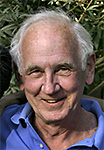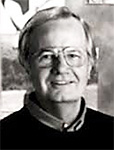First Peace Corps Conference: RPCVs on the Couch (Washington, D.C.)
Before the first Conference for Returned PCVs, the Peace Corps sent out 3300 questionnaires and 2300 were returned. Gary Bergthold (Ethiopia 1962-64) who was in 1965 working in the Peace Corps Medical Division, and chairman of the conference committee that read and tabulated the questionnaires told the opening session, “Elmo Roper, the American pollster, couldn’t believe it. This tremendous response, plus the fact that 90 per cent of those who replied said they wanted to attend this conference.”
He went on to say. “The first thing that becomes clear is the remarkable diversity of opinion among returned Volunteers. The greatest agreement on any one question was less than 15 per cent.”
 This was most obvious at the plenary session when Sargent Shriver called to the podium Ruth Whitney (Ghana 1962-64) and let her have her say as the Peace Corp Volunteer reported in its April 1965 Volunteer Magazine. Ruth, by the way, would go onto write two books, Feminism and Love: Transforming Ourselves and Our World and The Heart of Jesus’ Teaching: The Key to Transforming Christianity & Our World. She lives in retirement now in Florida.
This was most obvious at the plenary session when Sargent Shriver called to the podium Ruth Whitney (Ghana 1962-64) and let her have her say as the Peace Corp Volunteer reported in its April 1965 Volunteer Magazine. Ruth, by the way, would go onto write two books, Feminism and Love: Transforming Ourselves and Our World and The Heart of Jesus’ Teaching: The Key to Transforming Christianity & Our World. She lives in retirement now in Florida.
Ruth told the crowd of RPCVs and honored guests, “When I heard of the conference, I thought it was a bad idea. I haven’t thoroughly changed my mind yet….Why I thought this conference was wrong, and what I think is wrong with the Peace Corps, is that we are….promoting the idea that the Peace Corps is something special, and that the Volunteers are something special. And therefore when we come back, we’ve had a special experience, deserve some special privileges…in helping find a job….The idea of this conference seems to tell me that Mr. Shriver thinks we have to get together and talk about our special privileges, and I think that is wrong….”Help People Help Themselves’ is the motto of the Peace Corps. Well, we should be helping ourselves, and we shouldn’t ask for any help from the Peace Corps.”
 Roger Landrum (Nigeria 1961-63) would take a different tack, saying to the audience, “I would like to say for my fellow Volunteers that, after two years overseas, we are still less interested in what America can do for us than we are interested in what we can do for America and the Family of Man.”
Roger Landrum (Nigeria 1961-63) would take a different tack, saying to the audience, “I would like to say for my fellow Volunteers that, after two years overseas, we are still less interested in what America can do for us than we are interested in what we can do for America and the Family of Man.”
 Summing it all up would be Bill Moyers, who had helped create the Peace Corps in 1961 and in 1965 was in the White House working with the President. In his closing comment, he said at one point, “I have seen that the apparent contradictory nature of the Peace Corps continues to manifest itself. Never has any agency in Washington so consistently under gone psychoanalysis on a public couch and never have so many individuals in the history of our society so consistently exposed their neurotic tendencies in public like Peace Corps Volunteers have done. Frankly, I think that is indeed one of the fundamental reasons for the success of the Peace Corps.”
Summing it all up would be Bill Moyers, who had helped create the Peace Corps in 1961 and in 1965 was in the White House working with the President. In his closing comment, he said at one point, “I have seen that the apparent contradictory nature of the Peace Corps continues to manifest itself. Never has any agency in Washington so consistently under gone psychoanalysis on a public couch and never have so many individuals in the history of our society so consistently exposed their neurotic tendencies in public like Peace Corps Volunteers have done. Frankly, I think that is indeed one of the fundamental reasons for the success of the Peace Corps.”
Turning to the question of whether Volunteers are “special persons” or not, Moyers said, “You are special citizens…because you are volunteers and a volunteer in a free, democratic society is a person who by a conscious act of his or her will has left the ranks of bystanders and of spectators and become a participant…If you begin to think you are average then my only advice to you is to go back to your split-level home, turn on your television, drink your beer; somebody else will come up to serve in the Peace Corps.”
John, Thanks for starting to piece together all these things about the early days. I especially appreciate Bill Moyers’ observation.
Are you planning to assemble all the pieces into a new book? If you’re not, somebody should. –Tino